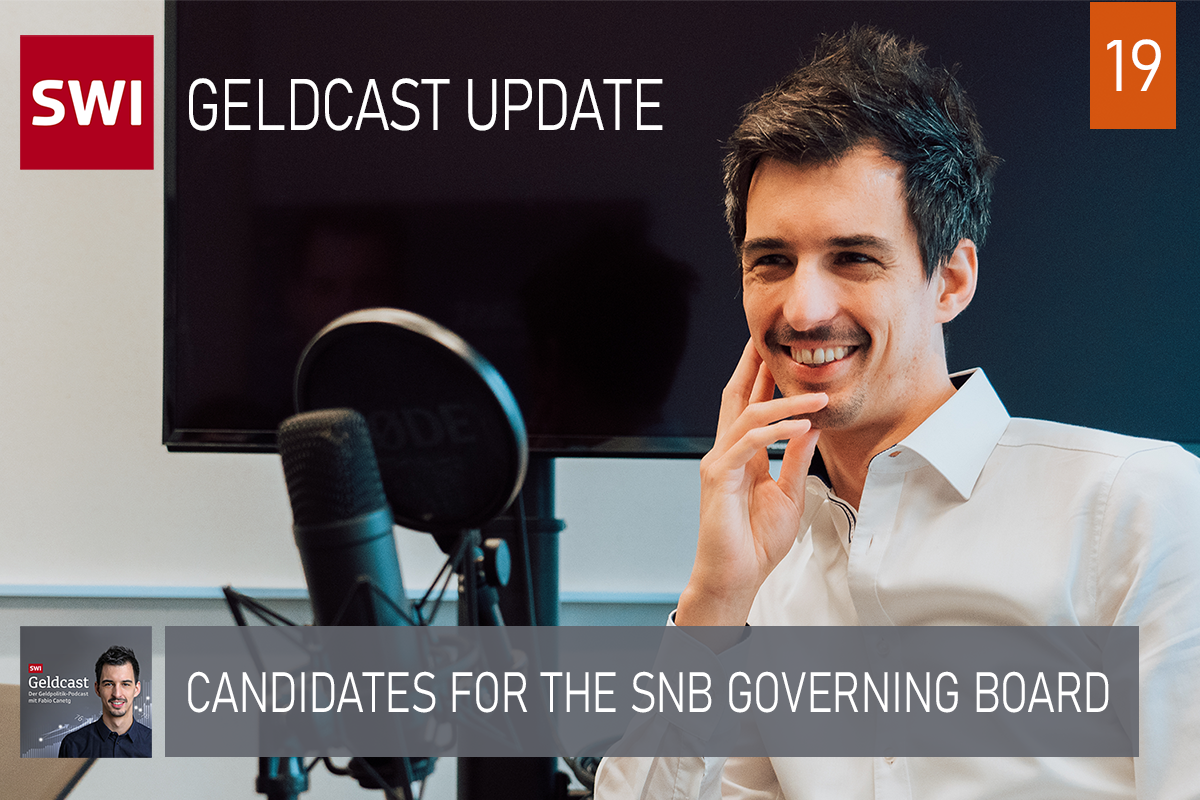
Who will replace Zurbrügg as Swiss National Bank governor?

The race is on. With Fritz Zurbrügg stepping down from the Swiss National Bank (SNB) Governing Board at the end of July 2022, the Federal Council will appoint a new board member. Who is likely to win the race?
Following heart surgery this year, SNB vice-chair Zurbrügg has announced his retirement at the end of July 2022. It will mark the end of a decade of serving as one of the three governors who determine monetary policy.
SWI swissinfo.ch has taken a closer look at the candidates to replace him – and their international connections.
Marlene Amstad
Marlene Amstad (53) stands a pretty good chance. She worked for the SNB research unit for two years in the 2000s and was the bank’s Deputy Director and Head of Investment Strategy and Financial Market Analysis for six years.
In 2011, Amstad left the central bank to join the Bank for International Settlement (BIS) as regional advisor and accepted a professorship at the Chinese University in Hongkong. One of her notable achievements during this time was the publication of her pioneering book on digital central bank money.
In spring 2020, the Swiss Federal Council elected Marlene Amstad as President of the Board of Directors of the Swiss Financial Market Supervisory Authority (FINMA), a position she holds to this day.
Her impressive qualifications and her age make Amstad a good contender to become the first woman at the helm of the SNB. She also has the experience and interest to revamp the central bank from its very core. People who have worked with Amstad say that during her time at the SNB she was very keen to bring in new ideas.
Her international experience in working for financial institutions that deal closely with central banks and her intellectual independence speak in her favour, while the fact that she currently cannot count on support from the SNB’s top management is against her.
Electing the SNB Governing Board
The members of the Governing Board are appointed by the Swiss government (Federal Council) whose decisions are based on recommendations by the SNB Bank Council. The central bank supervisory body is composed of representatives from the cantons and experts in the fields of science and economics.
The Federal Council has the freedom to make its own decision and is not tied to the Bank Council’s recommendation. However, if the Federal Council does not follow the body’s recommendation it would have to justify this perceived political affront towards the SNB.
The Federal Council also appoints the president of the board. Parliament has no say in this appointment.
Beatrice Weder di Mauro
Beatrice Weder di Mauro (56), one of Switzerland’s most renowned and well-connected economists, is also a promising candidate for the seat on the SNB Governing Board.
In the 1990s, Weder di Mauro joined the International Monetary Fund (IMF) as an economist and worked on the World Development Report for the World Bank in Washington DC. In Tokyo, she held a research position at the United Nations University and served on the Council of Economic Experts in Germany from 2004 to 2012. She currently holds a professorship at the Graduate Institute of International Development Studies in Geneva and serves as President of the Centre for Economic Policy Research (CEPR) in London.
Weder di Mauro has studied the correlation between CO2 taxes and inflation and published several papers on banking regulations. With her expertise she would be a perfect match for the SNB’s Department II which is responsible for financial stability.
She not only speaks German, French and English, but is also fluent in Italian and Spanish, which could play in her favour – as could her experience on economic policy committees, her extensive international network and her huge contribution to academic research. What goes against her is that she disqualified herself in the last race for a seat on the SNB Governing Board by accepting a board mandate at UBS, one of Switzerland’s biggest banks.
Martin Schlegel
SNB superstar Martin Schlegel (45) is considered a top candidate for the seat. After joining the SNB’s research unit, he became Head of the Foreign Exchange and Gold unit at the young age of 33 and ran the SNB branch in Singapore between 2016 and 2018. He is currently an Alternate Member of the SNB Governing Board which makes him directly involved in the SNB’s monetary policy decisions.
Schlegel is considered the star pupil of SNB President Jordan, which places him in a pole position in the upcoming race. His familiarity with the SNB’s Department I, which oversees monetary analyses, and the operational Department III, which deals with money market interventions, are further plus points.
Schlegel is very open and easy-going, which is rather atypical for SNB managers, and he is very popular among his peers at the central bank. His general competence and good relationship with Jordan play to his advantage, but his perceived reluctance to embrace new ideas could play against him.
Cédric Tille
Cédric Tille (51) enters the race as an outsider. At the end of the 1990s, he earned a doctorate under the tutelage of the influential economists Michael Woodford and Kenneth Rogoff at Princeton University and has been a professor at the Graduate Institute of International and Development Studies in Geneva since 2007. He is a member of the SNB’s Bank Council that monitors the SNB’s top management, including Thomas Jordan.
Tille has published dozens of research papers on international capital flows and money markets, some of which focused on Switzerland. His monetary policy is strongly influenced by his US education, which is also reflected in his quiet criticism of the central bank’s conservative attitude. He scores points for being an acclaimed monetary expert but would have to give up his seat on the SNB’s Bank Council if nominated as a potential governer.
Aymo Brunetti
Aymo Brunetti (58) has previously been considered as a candidate for the governing board for years. However, his chances of gaining a seat are pretty slim. Between 2003 and 2012, Brunetti was chief economist at the State Secretariat for Economics (Seco) and head of the Federal Expert Group for Banking Regulations after UBS bank’s near collapse in 2008. He is a professor at Bern University where he is well known for his outstanding lectures.
Brunetti is a household name in Switzerland but lacks international recognition. While his managerial experience is a plus point, his dearth of experience in research and his extremely conservative monetary policy work against him. In June 2021, Brunetti announced that he would not be available for an SNB governing position.

More
Geldcast Update: Candidates for the SNB governing board
Fabio CanetgExternal link earned a PhD in monetary economics and lectures at Bern University (in the MAS programme) as well as at the Toulouse School of Economics. He works as a journalist for SRF Arena, the Republik Magazine and swissinfo.ch. He also hosts the “Geldcast”External link podcast.

In compliance with the JTI standards
More: SWI swissinfo.ch certified by the Journalism Trust Initiative





























You can find an overview of ongoing debates with our journalists here . Please join us!
If you want to start a conversation about a topic raised in this article or want to report factual errors, email us at english@swissinfo.ch.